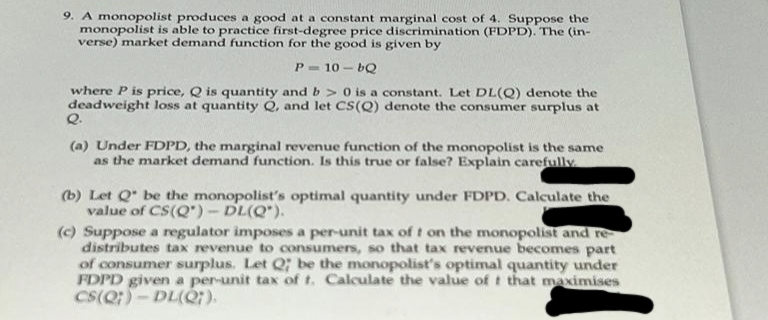9. A monopolist produces a good at a constant marginal cost of Suppose the monopolist is able to practice first-degree price discrimination (FDPD). The (in- verse) market demand function for the good is given by P=10-bQ where P is price, Q is quantity and b> 0 is a constant. Let DL(Q) denote the deadweight loss at quantity Q, and let CS(Q) denote the consumer surplus at Q. (a) Under FDPD, the marginal revenue function of the monopolist is the same as the market demand function. Is this true or false? Explain carefully. (b) Let Q be the monopolist's optimal quantity under FDPD. Calculate the value of CS(Q')-DL(Q). (c) Suppose a regulator imposes a per-unit tax of t on the monopolist and re- distributes tax revenue to consumers, so that tax revenue becomes part of consumer surplus. Let Q; be the monopolist's optimal quantity under FDPD given a per-unit tax of t. Calculate the value of t that maximises CS(Q)-DL(07).
9. A monopolist produces a good at a constant marginal cost of Suppose the monopolist is able to practice first-degree price discrimination (FDPD). The (in- verse) market demand function for the good is given by P=10-bQ where P is price, Q is quantity and b> 0 is a constant. Let DL(Q) denote the deadweight loss at quantity Q, and let CS(Q) denote the consumer surplus at Q. (a) Under FDPD, the marginal revenue function of the monopolist is the same as the market demand function. Is this true or false? Explain carefully. (b) Let Q be the monopolist's optimal quantity under FDPD. Calculate the value of CS(Q')-DL(Q). (c) Suppose a regulator imposes a per-unit tax of t on the monopolist and re- distributes tax revenue to consumers, so that tax revenue becomes part of consumer surplus. Let Q; be the monopolist's optimal quantity under FDPD given a per-unit tax of t. Calculate the value of t that maximises CS(Q)-DL(07).
Chapter14: Monopoly
Section: Chapter Questions
Problem 14.9P
Related questions
Question

Transcribed Image Text:9. A monopolist produces a good at a constant marginal cost of 4. Suppose the
monopolist is able to practice first-degree price discrimination (FDPD). The (in-
verse) market demand function for the good is given by
P=10-bQ
where P is price, Q is quantity and b> 0 is a constant. Let DL(Q) denote the
deadweight loss at quantity Q, and let CS(Q) denote the consumer surplus at
Q.
(a) Under FDPD, the marginal revenue function of the monopolist is the same
as the market demand function. Is this true or false? Explain carefully.
(b) Let Q be the monopolist's optimal quantity under FDPD. Calculate the
value of CS(Q')-DL(Q").
(c) Suppose a regulator imposes a per-unit tax of t on the monopolist and re-
distributes tax revenue to consumers, so that tax revenue becomes part
of consumer surplus. Let Q; be the monopolist's optimal quantity under
FDPD given a per-unit tax of t. Calculate the value of t that maximises
CS(Q)-DL(Q7).
Expert Solution
This question has been solved!
Explore an expertly crafted, step-by-step solution for a thorough understanding of key concepts.
Step by step
Solved in 5 steps

Knowledge Booster
Learn more about
Need a deep-dive on the concept behind this application? Look no further. Learn more about this topic, economics and related others by exploring similar questions and additional content below.Recommended textbooks for you


Principles of Economics (MindTap Course List)
Economics
ISBN:
9781305585126
Author:
N. Gregory Mankiw
Publisher:
Cengage Learning

Essentials of Economics (MindTap Course List)
Economics
ISBN:
9781337091992
Author:
N. Gregory Mankiw
Publisher:
Cengage Learning


Principles of Economics (MindTap Course List)
Economics
ISBN:
9781305585126
Author:
N. Gregory Mankiw
Publisher:
Cengage Learning

Essentials of Economics (MindTap Course List)
Economics
ISBN:
9781337091992
Author:
N. Gregory Mankiw
Publisher:
Cengage Learning

Principles of Microeconomics (MindTap Course List)
Economics
ISBN:
9781305971493
Author:
N. Gregory Mankiw
Publisher:
Cengage Learning

